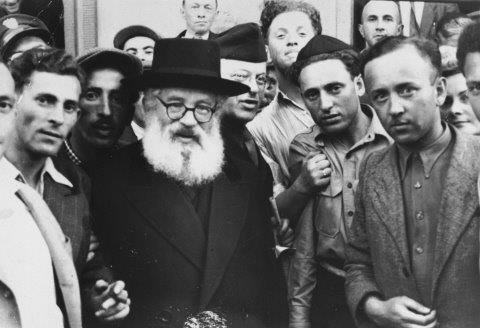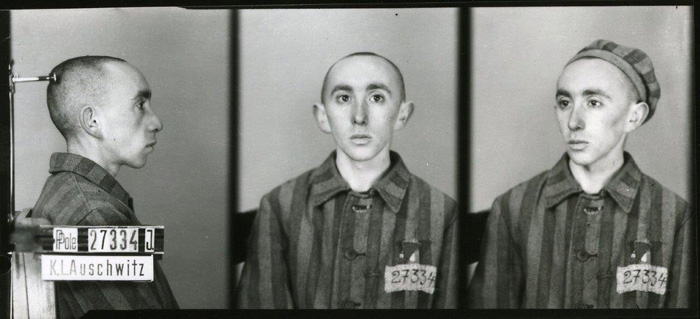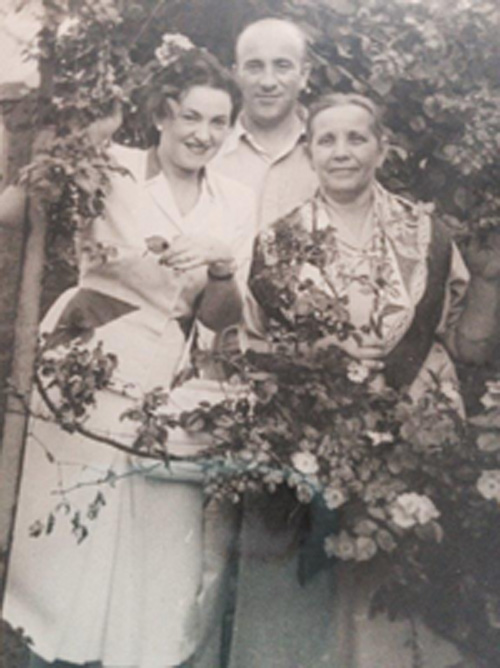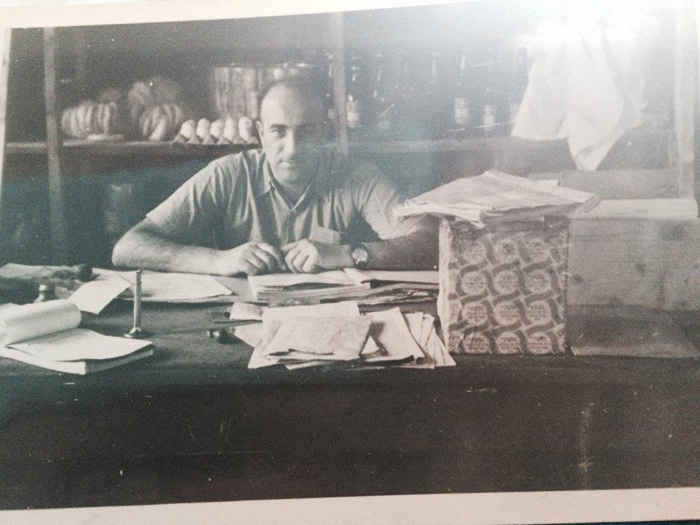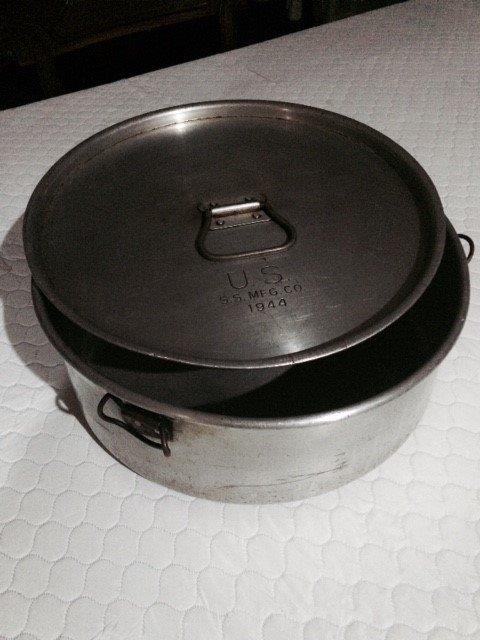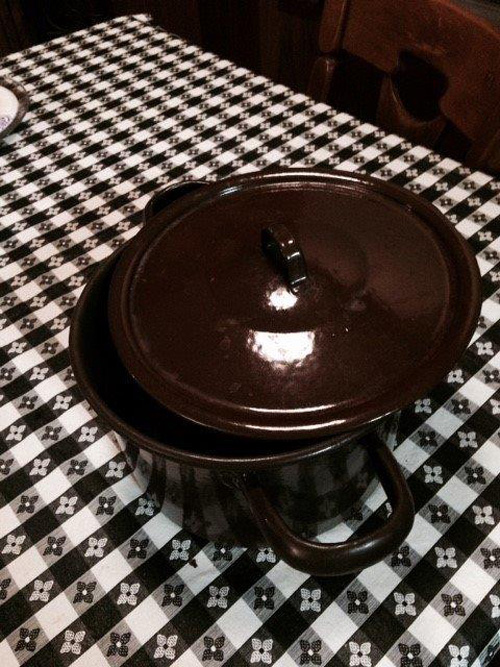- Beit Yaakov schools are Orthodox full-time Jewish elementary and secondary schools for Jewish girls from religious families, first established by a seamstress named Sarah Schenirer in 1917 in Krakow, Poland.
- The Irgun (the first Hebrew word of the title "The National Military Organization in the Land of Israel") and the Haganah (Hebrew for "defense") were Jewish paramilitary organizations that operated in Mandate Palestine before the formation of the Israel Defense Forces.
- Yiddish, for the Golden Land.
The Lampertheim Displaced Persons ("DP") camp was located in a small town on the bank of the Rhine in the Frankfurt District of the American occupational zone. It operated between the end of 1945 and May 1949 and housed 1200 Jewish DPs, mainly from Poland. In comparison with other camps, the inhabitants of Lampertheim were relatively well-off. They lived in requisitioned private houses in the village. The camp organized its own civic administration, with thirty unarmed policemen and a uniformed fire service. There was a post office which operated as a tracing bureau for missing relatives of the camp’s community. The health center in the camp was operated by doctors, who were at the same time DPs and residents of the center.
The camp had a strong orthodox community and maintained a developed religious life, with a synagogue located in a converted private house, a kosher kitchen for ninety DPs and a Talmud Torah. There was also a Hebrew library, culture house, a theatre group and a small orchestra. The camp also ran a secular elementary school and a kindergarten. A summer camp was organized for the children during the holidays. A few kilometers from the town, the camp operated a kibbutz for thirty young people training in farming in preparation for their emigration to Palestine. The ORT school had ninety-seven students, most of whom attended a course in dressmaking and worked in the modern clothes repairing workshop organized in the camp.
Below is an extract of an interview with June (Goldie) who spent several months in Lampertheim after the war.
Can you tell me a little about yourself and your family from before the war?
My maiden name was Goldie Mann. I was born in July 1920, in a small town called Makow Podhalanski, near Krakow. There wasn't much of a Jewish community there - I'm not sure why my parents chose to live there.
My brothers had to go to Belz to the Yeshiva, because there was nothing in Makow for them. My sisters and I went to the local Polish school where we learnt to speak Polish which helped me later on. There was a Beit Yaakov1 school nearby, but my father didn't want to send us there.
I had 3 sisters and 3 brothers, all born between 1914 and 1926. My father wasn’t a Rabbi but he was the “posek” for the community and quite well-known in our little town. Jews came to him with their questions. My two grandmothers lived with us as well. They died from natural causes before the war.
Do you remember what happened when war broke out?
When war broke out in 1939, my family was advised, by a friend, to leave immediately for Russia, but because it was a Friday night, my father said he couldn’t leave until Motzei Shabbos (after the Sabbath had ended). Shabbos was September 1st, and by Motzei Shabbos the borders were closed and it was too late to leave. My family stayed together until 1942, but it was increasingly difficult to get food. Although there were restrictions, we were able to remain in our house and there was no ghetto.
- 1. Beit Yaakov schools are Orthodox full-time Jewish elementary and secondary schools for Jewish girls from religious families, first established by a seamstress named Sarah Schenirer in 1917 in Krakow, Poland.
What happened next?
In February 1942, the Gestapo came and took my brother Mordechai away. He was able to send a note home, with the Psalm "Min Hametzer” written on it. He didn't write anything else. We know he was sent to Auschwitz and was killed there.
A literal translation of the prayer is as follows:
In distress I called on the Lord; the Lord answered me and brought me relief
The Lord is on my side I have no fear; what can man do to me?
With the Lord on my side as my helper, I will see the downfall of my foes
It is better to take refuge in the Lord, than to trust in mortals
It is better to take refuge in the Lord than to trust in the great [human benefactors]
All nations have beset me; by the name of the Lord I will surely cut them down
They beset me, the surround me; by the name of the Lord I will surely cut them down
They have beset me like bees; they shall be extinguished like burning thorns;
by the name of the Lord I will surely cut them down
You pressed me hard, I nearly fell; but the Lord helped me
The Lord is my strength and might; He has become my deliverance
The tents of the righteous resound with joyous shouts of deliverance,
the right hand of the Lord is triumphant!
The right hand of the Lord is exalted! the right hand of the Lord is triumphant!”
I shall not die but live and proclaim the works of the Lord
The lord has punished me severely, but did not hand me over to death
Open the gates of victory for me that I may enter then and praise the Lord
This is the gateway to the Lord, the righteous shall enter through it
I praise You, for You have answered me, and have become my deliverance
The stone that the builders rejected has become the chief cornerstone
This is the Lord’s doing; it is marvelous in our sight
This is the day that the Lord has made - let us exult and rejoice in it
On March 21, 1942, the Gestapo came to our door and took my father away. We never saw him again. As I mentioned before, he was somewhat of a communal figure for our small community. He was shot at Gestapo headquarters that night. Over the next few weeks, a total of 33 people, among them women and a young girl, were shot and killed at the headquarters. No explanation was given as to why they were taken, and all were buried in the same church yard in Krakow. Since my father was not shot with the rest of the Jews, but shot alone, I knew exactly where his grave was, even though it was unmarked. Our town was "liquidated" in September 1942, exactly three years after the outbreak of the war. All the Jews from the town were told to leave their homes and prepare for deportation. They had no idea they were being taken to Belzec, and I believe none survived. My sister Eva wanted to run away. At that time she didn’t know her husband was already dead. We drew straws to decide who should go with her and I won. My sister and I hid in a hayloft, and were able to hear the barking of dogs, yelling of orders, shooting of people, and their cries as well, as the town was being liquidated. Both of us were able to get Aryan papers, which were actually baptismal certificates which were then converted to ID papers. I never saw my family again. My sister survived for a while, but we were separated. My sister was taken to Auschwitz with some Polish people who were randomly gathered up when a Nazi was shot. She died there, in the non-Jewish part of the camp, as a Pole.
Using my Aryan papers, I wandered from Poland to Hungary (Budapest), and then to Romania (Bucharest). (I have quite a few stories). I left Budapest in 1943, before the Germans got there and in Romania, I was helped by an organization that gave help to refugees, but this was all due to the fact that I had Aryan papers and managed to hide my Jewish identity, otherwise I wouldn't have been helped.
What happened after the war?
After the war, I went back to Krakow. There was a committee there that helped survivors. They had a registry, to help people find relatives and friends. No one I knew had registered with them, and there were no survivors from Makow, and I was the only survivor from my family.
I wanted to rebury my father in a Jewish cemetery, and I asked the committee to help me, but they couldn't, because they said they didn't even have enough money to help the living. They did give me a sewing machine, and helped me find a place to live. They also sent me clients who needed/wanted sewing done.
I found out from the church that all 33 people had to be reburied, not just my father. They wouldn't let me take just him. I asked a Rabbi who told me that actually, that was probably correct. In any case, I started saving money so that I could do it, but it was a task that might have taken me forever, since I was told that it would be very expensive to do this.
Can you tell me about your husband and his family?
My future mother-in-law, husband and brother-in-law all had Aryan papers, and I know that my husband worked as a farmhand. I don't know how they got the papers or when. They were all in the Tarnow Ghetto, including my father-in-law. They started to leave the ghetto one at a time. First my brother-in-law Simon and mother-in-law left. Simon was already a qualified doctor. My father-in-law and future husband were there until the Germans started liquidating the ghetto. My father-in-law couldn't get out in time and was sent to Auschwitz. My husband walked out during the confusion of the liquidation and got onto a wagon, and no one caught him. At some point he was severely beaten by some Germans, which caused permanent damage to his kidney. Much later in 1955 or 1956 it had to be removed.
He tried to go back to his town (Ujscie Jezuickeie - near Tarnow) after the war, but they were killing Jews who came back, so he didn't. He told me that he saw someone who had been lynched, with a sign around his neck that said, "This is what we do to Jews who come back." In any case, the family members who had survived decided to go to Germany, to the American Zone, which is how they arrived at Lampertheim. I think this was in late 1945 or early 1946.
My future husband, Joshua, returned to Poland later from Germany to sell the house that his family had owned, and to dig up jewelry that he had buried somewhere. He sold the house, found that the jewelry was still there, and sold it. At that point, we met, and talked about getting married. I said that I couldn't get married until all the people were reburied in a Jewish cemetery. The money that he had from the house and the jewelry was used for that,
After the reburial I felt I could think about getting married.
When did you get to the DP Camp Lampertheim?
At this point, it was spring of 1948. We got married in a Polish court, then went to Lampertheim, where we had a Jewish wedding in June 1948. I would not have been able to live there if we had not been married, because by 1948 they weren't taking any more people. It made sense to go there because my husband’s brother and mother were there, too.
The term "DP camp" may be misleading. This particular camp was just a neighborhood, where the Americans had housed Jewish survivors. I don't know what happened to the Germans who lived there during the war. My husband said that when he got there, the houses were empty, and no one asked any questions. The Americans provided furniture, food, and a small stipend.
I didn't work there, but my husband did, in the DP camp store. (I think there may have been some black market activity there). The Americans gave him an UNWRA uniform. My brother-in-law Simon was a doctor, and was kept quite busy, as there were a lot of children born there.
Simon was also very involved with the shlichim (emissaries), who came from Palestine to recruit people to go to Israel, and he was also involved in raising money for arms for the Irgun and Haganah.2 In fact, when Moshe Sharett came to Lampertheim, he stayed in our cottage.
My brother-in-law, Simon Schmalholz (who later changed his name to Salholz), was an ardent Zionist, and apparently worked very hard to get money to Israel. I don't know why he decided to go the US instead of Israel - it really doesn't make sense, but I don't know the reason.
In Lampertheim, everyone was getting married, mostly to people who had come from the same country as they did, and were Jews. Love was not an issue at the time, and many would have never gotten married to each other before the war. They just wanted to not be alone any more, and to have children. All were survivors of camps, very few had been hidden or had Aryan papers. Some had lost families and were starting again. All were there temporarily, until they could get visas to the USA, or go to Israel. I personally didn't take part in any activities. People worked, and we just sat around waiting to go somewhere else. Most people there were in their 20’s and 30’s because the older and younger people hadn’t survived.
We didn't want to wait to get a visa to the US. By that time I was pregnant, and I didn't want to have a baby in Germany. We got on a list to go to Israel, and were told to go to Nice to get on the ship. The journey on a ship took three weeks and was by no means luxurious, but we were excited to be starting our new life.
What happened when you arrived in Haifa?
We arrived in Haifa in the winter of 1948-49. We knew a family that I had met in Romania, who lived in Jaffa, and we were able to stay with them. These people were living in a large apartment, and were running a restaurant.
Later, my husband found an apartment in Ramat Gan, and we moved into it in the winter of 1949-50. Our baby was born with a congenital heart defect and only lived a month. I still feel that if she had stayed in Germany, where there was more food, the baby might have lived.
- 2. The Irgun (the first Hebrew word of the title "The National Military Organization in the Land of Israel") and the Haganah (Hebrew for "defense") were Jewish paramilitary organizations that operated in Mandate Palestine before the formation of the Israel Defense Forces.
What do you remember about those first months?
We were in Israel for the first Yom Haatzma'ut (Independence Day). The feeling was unbelievable. People were singing, dancing, and crying in the streets. People who generally didn't really have much to do with each other (everyone was friendly with people who spoke the language of the country they came from) were hugging each other in the streets. I felt thankful that I could be there to see, after 2,000 years, that we had a home.
Why did you eventually go to live in America?
In 1956, during the Suez campaign, my daughter Ruth was 5 years old. I had lost my entire family, parents, grandmothers, 6 brothers and sisters, countless aunts, uncles, cousins – and after all that, a baby. My husband was luckier - he had a brother and mother. Still, we had all been through a lot. We didn't want to go through any more wars, and the fact that my daughter asked me to hide her, so that the Arabs wouldn't get her, didn't help. We decided to go to America, the "goldene medina" 3. It didn't turn out to be what we expected, but we worked very hard, and started all over again. To this day, I feel we should have stayed in Israel, where I was the happiest. At the age of 94, I never stop thinking about Israel and all that it means to me. After 57 years in New York, I am grateful for all that the United States offers, all the freedom we have to live as Jews, but to me Israel was and will always be home.
I feel blessed to have in total three grandchildren, and eight great-grandchildren, and I am happy that my granddaughter Liana lives in Israel with her husband Michael and three of my great-granddaughters.
- 3. Yiddish, for the Golden Land.




